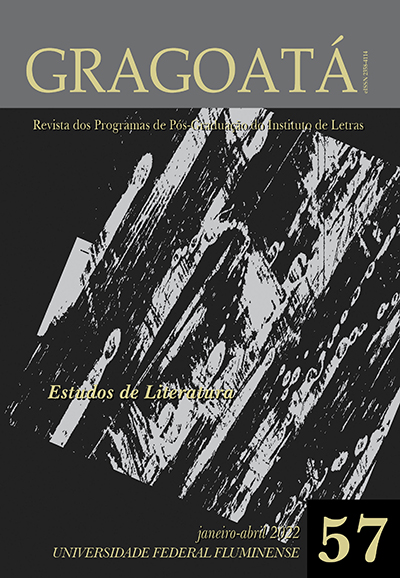A voz oracular de Francisco Carvalho
DOI:
https://doi.org/10.22409/gragoata.v27i57.47876Resumo
Neste artigo, a poesia do poeta brasileiro Francisco Carvalho é estudada sob a perspectiva das suas aquisições formais, considerando-se o seu desenvolvimento temporal ao longo de seis décadas, e das características do imaginário que a perpassa. Partindo da ideia de que nela se realiza um encontro de tradições – no qual os ecos do Classicismo português se mesclam a uma linguagem francamente moderna ou derivada dos códigos da escrita modernista, amalgamados pela dicção própria do poeta, em que o diálogo entre tais elementos se afirma como vetor predominante, buscamos compreender o modo como certas imagens da vida empiricamente vivida, com suas determinações de tempo e lugar, encontram na palavra poética do autor o seu contorno e o seu acabamento. A vida, nessas condições, não termina, mas também não começa, pois a abertura da obra no âmbito do imaginário a expande em todas as direções. Instaura-se assim um tempo de exílio que será tanto o tempo do mito e do imaginário, quanto o tempo daquilo que chamamos aqui de uma fala profética ou oracular, que não se deixa aprisionar pelas compartimentações da razão ou da memória. O voo da palavra escapa, sempre, para uma outra dimensão, onde todo evento de enunciação se converte imediatamente numa abertura ou numa ultrapassagem. Objetiva-se, no estudo, a partir da análise e do comentário da trajetória poética de Francisco Carvalho, compreender essas relações e interrogar o seu sentido.
Downloads
Downloads
Publicado
Como Citar
Edição
Seção
Licença
AUTORIZAÇÃO
Autores que publicam em Gragoatá concordam com os seguintes termos:
Os autores mantêm os direitos e cedem à revista o direito à primeira publicação, simultaneamente submetido a uma licença Creative Commons Atribuição 4.0 Internacional (CC BY 4.0), que permite o compartilhamento por terceiros com a devida menção ao autor e à primeira publicação pela Gragoatá.
Os autores podem entrar em acordos contratuais adicionais e separados para a distribuição não exclusiva da versão publicada da obra (por exemplo, postá-la em um repositório institucional ou publicá-la em um livro), com o reconhecimento de sua publicação inicial na Gragoatá.
A Gragoatá utiliza uma Licença Creative Commons - Atribuição CC BY 4.0 Internacional.














